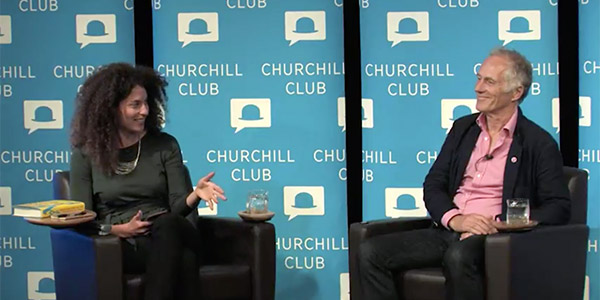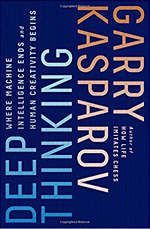
|
Humans are the biome of artificial intelligence
|
Veteran journalist Steven Levy recently spoke with Tim O'Reilly, whom Levy calls "the conscience of the tech industry," to discuss the impetus behind Tim's new book, WTF? What's the Future and Why It's Up to Us, in the context of growing apprehension about automation, artificial intelligence, and the threat to jobs. Tim believes that financial markets represent the first example of rogue AI, and that ultimately AI will benefit humanity if we make some fundamental changes to our collective values. Here's one sliver of his perspective:
If you think about the internet as weaving all of us together, transmitting ideas, in some sense an AI might be the equivalent of a multicellular being, and we're its microbiome, as opposed to the idea that an AI will be like the golem or the Frankenstein [monster]. If that's the case, the systems we are building today, like Google and Facebook and financial markets, are really more important than the fake ethics of worrying about some far future AI. We tend to be afraid of new technology, and we tend to demonize it, but to me, you have to use it as an opportunity for introspection. Our fears ultimately should be of ourselves and other people.
Read the complete interview in Wired: "Algorithms have already gone rogue."
|
On reality, imagination, and the future
|
Tim seems to be everywhere in the lead-up to the October 10 release of WTF? (Watch for it on Safari; in the meantime, check out this excerpt.) Here's one snippet of his wide-ranging conversation on Edge that roams from Wallace Stevens to current thinkers like Jeff Bezos, Richard Dawkins, and Yuval Noah Harari, to Napoleon, touching on the fall of Rome, the plague, the New Deal, Fermi's paradox, the recent hurricanes, and a slew of other references:
Our job is to imagine a better future, because if we can imagine it, we can create it. But it starts with that imagination. The future that we can imagine shouldn't be a dystopian vision of robots that are wiping us out, of climate change that is going to destroy our society. It should be a vision of how we will rise to the challenges that we face in the next century, that we will build an enduring civilization, and that we will build a world that is better for our children and grandchildren and great-grandchildren.
Watch the video or read the transcript to learn more about Tim's vision: "Reality is an activity of the most august imagination."
Tim also recently appeared on the VoiceFirst Roundtable podcast ("Tim O'Reilly says don't eat the ecosystem, a lesson for voice platforms") and the Science Disrupt podcast ("Getting to Science 2.0").
In addition, the Churchill Club recently hosted a conversation between Tim and Elizabeth Dwoskin, Silicon Valley correspondent for the Washington Post, who states at the outset that Tim is one of the people she goes to to think about the future. Here's one insight:
As we build these vast systems where we are encoding our knowledge and our beliefs into an algorithmic system, we start to see our biases….It's starting to be front and center because we are going "Wow, we are about to encode this into a system." And this is actually part of the opportunity of the present moment because it forces us to ask questions about who we are and who we want to be.
Watch the full interview here.
+ Heads up! This Sunday, October 8, tune in to Fox News at 9 PM ET to catch Tim live on The Next Revolution with Steve Hilton.
|
Fear of disruption can be worse than disruption
|
PwC's recent study on the impact of competitive upheaval found that companies facing disruption typically have more time to respond than they expect and that an effective response usually exists. More harm accrues from panic-driven efforts to ward off disruption; reactive, scattershot decision making derails management and wastes resources. Failure to act can be equally damaging. Find out more about the true pace and impact of disruption and discover how real-world companies have assessed and strategically responded to new threats in a changing competitive environment in this article from strategy+business: "The fear of disruption can be more damaging than actual disruption."
+ From Bloomberg Businessweek: "Silicon Valley's next target for disruption is socks."
|
Pew study on attitudes toward automation and work
|
Pew Research Center just released a study finding that Americans are less enthusiastic and more worried about ongoing automation, but their concerns focus on potential job losses for other people as they remain confident that their own jobs are secure. The study also finds that while the majority of respondents realize automation is underway, they are reluctant to remove the human element from many specific situations, including autonomous vehicles, robot caregivers, and computer evaluation of job applicants. In addition, workers who did not attend college are more likely to have negative attitudes toward workplace technologies than those with higher levels of education. Read the full report: Automation in Everyday Life.
+ Quartz on teaching assistant (TA) bots: "Imagine how great universities could be without all those human teachers."
|
Deeper reading: Deep Thinking
|
 Garry Kasparov will go down in history as the international chess champion who was beaten by IBM's Deep Blue in 1997 in a six-game rematch after having bested the supercomputer in 1996. His defeat set off the man-versus-machine debate that rages on today. Kasparov recounts his experience along with his reflections on the significance of the event and the advent and future of AI in his book Deep Thinking: Where Machine Intelligence Ends and Human Creativity Begins. Since his defeat, Kasparov has become an advocate of AI as a means to augment human potential, as this Guardian review explains. The LA Times explores the history of programming computers to play chess in this review, and MIT Technology Review weighs in here. Vivek Wadhwa penned this review in the Washington Post. This Wall Street Journal review focuses on Kasparov's belief that computers will take over menial tasks so that people can pursue more creative endeavors. Kasparov delivered this TED Talk in April; here's a video of Kasparov speaking at TechCrunch Disrupt in May. And here's a recent story in Fortune by Kasparov that reveals his optimism about the potential of AI and machine learning: "There's no shame in losing to a machine." Garry Kasparov will go down in history as the international chess champion who was beaten by IBM's Deep Blue in 1997 in a six-game rematch after having bested the supercomputer in 1996. His defeat set off the man-versus-machine debate that rages on today. Kasparov recounts his experience along with his reflections on the significance of the event and the advent and future of AI in his book Deep Thinking: Where Machine Intelligence Ends and Human Creativity Begins. Since his defeat, Kasparov has become an advocate of AI as a means to augment human potential, as this Guardian review explains. The LA Times explores the history of programming computers to play chess in this review, and MIT Technology Review weighs in here. Vivek Wadhwa penned this review in the Washington Post. This Wall Street Journal review focuses on Kasparov's belief that computers will take over menial tasks so that people can pursue more creative endeavors. Kasparov delivered this TED Talk in April; here's a video of Kasparov speaking at TechCrunch Disrupt in May. And here's a recent story in Fortune by Kasparov that reveals his optimism about the potential of AI and machine learning: "There's no shame in losing to a machine."
+ "Why AlphaGo is a bigger game changer for artificial intelligence than many realize"
|
|
|